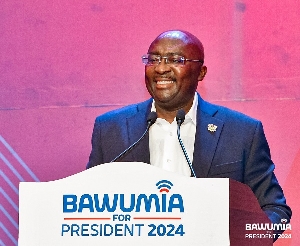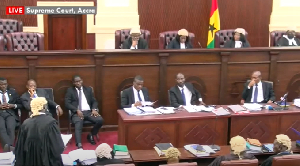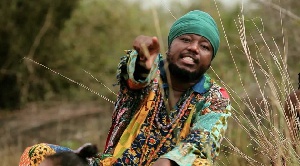Opinions of Monday, 19 February 2024
Columnist: Dr. Abubakari Sidick Ahmed
Dr. Bawumia's Vision: Ghana's gold reserves - A $10 trillion game changer for the economy
In a groundbreaking move that could reshape Ghana's economic landscape, Vice President Dr. Bawumia has unveiled a bold plan to revitalize the country's mining industry, with a special focus on its abundant gold reserves. With estimates suggesting that Ghana's gold reserves could be worth a staggering $10 trillion, Dr. Bawumia's plan holds the promise of transforming the nation's economy and propelling it towards unprecedented levels of growth and prosperity.
Gold has long been a cornerstone of Ghana's economy, with the country being one of the top producers of the precious metal in Africa. However, in recent years, the mining industry has faced challenges ranging from declining production levels to environmental concerns. Dr. Bawumia's plan aims to address these issues head-on, leveraging Ghana's gold reserves to unlock new opportunities for economic development and sustainable growth.
One of the key pillars of Dr. Bawumia's strategy is to attract increased investment in the mining sector, with a focus on modernizing infrastructure and technology to enhance productivity and efficiency. By leveraging cutting-edge mining techniques and practices, Ghana can maximize the extraction of its gold reserves, leading to a significant boost in production levels and revenues.
Moreover, Dr. Bawumia's plan includes measures to promote responsible mining practices that prioritize environmental sustainability and community engagement. By ensuring that mining activities are conducted in a socially and environmentally responsible manner, Ghana can not only protect its natural resources but also foster positive relationships with local communities and stakeholders.
The potential impact of Dr. Bawumia's plan on Ghana's economy is immense. With estimates suggesting that the country's gold reserves could be worth $10 trillion, a revitalized mining industry has the potential to significantly increase Ghana's GDP and create thousands of jobs for its citizens. The increased revenues generated from gold exports could also provide much-needed funding for critical infrastructure projects, healthcare initiatives, and education programs, further fueling economic development across the country.
Furthermore, by positioning Ghana as a global leader in responsible gold mining practices, Dr. Bawumia's plan could attract international investment and partnerships, further boosting the country's economic prospects. With the right policies and incentives in place, Ghana has the opportunity to become a hub for sustainable mining practices that not only benefit the economy but also contribute to global efforts towards environmental conservation and social responsibility.
In conclusion, Dr. Bawumia's ambitious plan to revive Ghana's mining industry with a focus on its gold reserves has the potential to be a game changer for the country. By unlocking the full economic potential of its gold reserves, Ghana can pave the way for sustainable growth, increased prosperity, and lasting development. With strategic planning, investment, and commitment to responsible practices, Ghana is poised to harness its natural wealth for the benefit of its people and secure a prosperous future for generations to come.
In addition to revitalizing Ghana's mining industry through increased investment and modernization, Vice President Dr. Bawumia's plan also includes a new mining model that emphasizes value addition and the growth of new mining enterprises and entrepreneurs. Under this model, the Government of Ghana will directly purchase gold from local miners, aiming to shore up the country's gold reserves and strengthen its macroeconomic indicators.
By buying gold directly from miners, the government can bolster Ghana's gold reserves, which in turn can have significant positive impacts on the country's macroeconomic indicators. One key benefit is the strengthening of Ghana's balance of payments position. As the government accumulates more gold reserves, it increases the country's foreign exchange holdings, which can help stabilize the currency and improve Ghana's ability to meet its external obligations.
Furthermore, shoring up gold reserves can enhance Ghana's credibility in international financial markets. A robust reserve position signals to investors and creditors that the country has a solid foundation of assets to support its economic stability and growth. This can lead to increased investor confidence, lower borrowing costs, and improved access to international capital markets for Ghana.
Moreover, a higher level of gold reserves can provide a buffer against external shocks and economic uncertainties. In times of global economic volatility or fluctuations in commodity prices, a strong reserve position can help cushion Ghana's economy against adverse impacts and provide a source of stability to support continued growth and development.
Additionally, shoring up gold reserves can have positive implications for inflation management and monetary policy. Increased reserves can provide the central bank with greater flexibility to manage liquidity in the financial system and control inflationary pressures. By using gold reserves strategically, Ghana can enhance its monetary policy effectiveness and ensure price stability in the economy.
Overall, by introducing a new mining model focused on value addition and direct purchase of gold from miners to shore up Ghana's reserves (Gold for reserves), Vice President Dr. Bawumia's plan has the potential to strengthen the country's macroeconomic fundamentals and position it for sustained economic growth. With a solid reserve base, Ghana can enhance its financial resilience, attract investment, and create a more stable and prosperous future for its citizens.
Ghana's frequent engagement with the International Monetary Fund (IMF) over the years, a total of 17 times since gaining independence, is a clear indication of the country's historical struggle to maintain adequate foreign reserves. The primary reason for these repeated bailouts has been the persistent challenge of shoring up foreign reserves to stabilize the economy and prevent currency devaluation.
According to reports from both the IMF and the World Bank, Ghana's reliance on exporting raw materials, particularly gold, without adding significant value locally has contributed to its vulnerability to external shocks and fluctuations in commodity prices. This over-reliance on raw material exports has left Ghana exposed to market volatility and has hindered its ability to build up sufficient foreign reserves to weather economic crises.
Dr. Bawumia's vision of shifting towards a new paradigm that focuses on adding value locally and directly purchasing gold from artisanal miners (Oil for Gold) deal and (Gold for reserves) could potentially transform Ghana's economic landscape. This paradigm shift will be the first successful attempt since independence to change the colonialist model of exploiting our natural resources for export which we tragically continued since independence.
By encouraging local processing and value addition, Ghana can increase its export earnings and reduce its dependence on raw material exports. This shift would not only create more sustainable revenue streams but also help boost foreign reserves, thereby reducing the need for repeated IMF bailouts.
Furthermore, by bypassing middlemen and purchasing gold directly from artisanal miners, the government can ensure greater transparency and accountability in the mining sector. This approach could help curb illegal mining activities and promote responsible mining practices, which would ultimately contribute to the long-term stability of Ghana's economy.
By implementing these reforms and diversifying its economy away from a heavy reliance on raw material exports, Ghana can potentially break free from the cycle of seeking IMF bailouts. Dr. Bawumia's vision represents a promising opportunity for Ghana to strengthen its economic resilience and reduce its vulnerability to external shocks, ultimately paving the way for sustainable growth and development.
To achieve Vice President Dr. Bawumia's vision of deepening the oil-for-gold deal and gold-for-reserves, by revitalizing Ghana's mining industry, a collaborative effort involving various stakeholders is essential. Here are some suggestions on how different sectors can contribute:
1. Media: The media can play a crucial role in raising awareness about the benefits of the oil-for-gold deal and the importance of sustainable mining practices. They can also hold government officials and mining companies accountable for their actions, promoting transparency and responsible resource management.
2. Academia: Academia can provide valuable research and expertise on mining policies, economic diversification, and sustainable development. They can conduct studies to assess the impact of the oil-for-gold deal on Ghana's economy and society, offering insights for policymakers to make informed decisions.
3. Corporate Bodies: Mining companies and other corporate bodies involved in the sector can support the government's initiatives by adopting best practices in environmental protection, community engagement, and ethical business conduct. They can also invest in local communities, infrastructure development, and skills training to create shared value and long-term sustainability.
4. Security Services: The security services can help ensure a safe and secure operating environment for mining activities, protecting workers, assets, and communities from potential risks such as theft, illegal mining, and conflict. They can collaborate with relevant stakeholders to enforce regulations and prevent illicit activities in the sector.
5. Mining Communities: Local communities living near mining sites should be actively engaged in decision-making processes and benefit-sharing mechanisms. Their voices should be heard, their rights respected, and their well-being prioritized through inclusive development projects, job opportunities, and social amenities.
6. Ghanaians at Large: Every Ghanaian has a role to play in supporting the country's economic growth and sustainable development. By promoting a culture of accountability, integrity, and civic responsibility, Ghanaians can contribute to a more transparent, equitable, and prosperous society for future generations. Buying into this vision
7. Chiefs:
a. Advocating for responsible mining practices: Chiefs can use their influence and authority to promote sustainable and environmentally friendly mining practices within their communities. They can encourage mining companies to adhere to regulations and guidelines that protect the environment and the well-being of residents.
b. Facilitating dialogue and collaboration: Chiefs can act as mediators between mining companies, government agencies, and local communities to facilitate constructive dialogue and collaboration. This can help address issues of land rights, compensation, and community development more inclusively and transparently.
c. Promoting local economic development: Chiefs can work with mining companies to ensure that local communities benefit from mining activities through job creation, skills development, and support for local businesses. They can also advocate for revenue-sharing agreements that allocate a portion of mining profits to community development projects.
d. Preserving cultural heritage: Chiefs can play a crucial role in preserving the cultural heritage and traditions of their communities in the face of rapid industrialization and mining activities. They can work with mining companies to ensure that sacred sites and cultural practices are respected and protected.
e. By actively engaging with stakeholders, advocating for responsible practices, and promoting sustainable development, Chiefs can help achieve Dr. Bawumia's vision of enhancing the productivity of the mining industry, particularly in the gold sector.
In conclusion, the strategic vision and initiatives by Vice President Dr. Bawumia to deepen the oil-for-gold deal and revitalize Ghana's mining industry hold immense potential for transforming the country's socioeconomic landscape. In the immediate term, these policies can generate savings, create employment, and enhance economic stability.
In the medium term, they can strengthen Ghana's position in global markets, attract investment, and promote inclusive growth. Looking ahead to the long term, these initiatives have the power to foster sustainable development, reduce poverty, and improve the quality of life for all Ghanaians. A bold attempt of this nature was set in motion by the Dr. Hilla Liman democratic government
By harnessing the collective efforts of the media, academia, corporate bodies, security services, chiefs, mining communities, and citizens at large, Ghana can realize its vision of a thriving economy, vibrant society, and sustainable future. Together, we can build a more resilient, prosperous, and equitable nation that benefits present and future generations alike.













